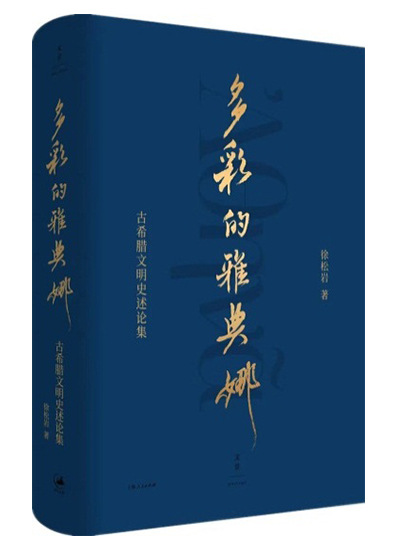A Chinese perspective on ancient Greek civilization

The Colorful Athena: The History of Ancient Greek Civilization
The Colorful Athena: The History of Ancient Greek Civilization, by Xu Songyan, a professor from the School of History and Culture at Southwest University (SWU), vertically reviews the development of ancient Greek history and horizontally clarifies the evolution of major institutions and inter-state relations. It also macroscopically compares Chinese and Greek history, striving to delineate the panorama of ancient Greek history in the historical context of both the Eastern Mediterranean and the globe.
The book showcases the twists and turns of the Greek history, from the origins of the early Greeks, the formation of the state, the evolution from city-state to empire, to its decline and annexation. In Xu’s view, the fundamental standard for the development of the clan tribe into the early state is “public power,” identifying the “city-state” as termed by Aristotle as an “early slavery state.” The transformation of Athens from a city-state to an empire benefited from its seizing the opportunity of the Greco-Persian Wars and enslaving the states of the Delian League. In the process, the expansion of territory, the construction of cities, and the development of science and culture mirror the rise and fall of Athens’ national power.
After the Peloponnesian War, the Athens city-state crisis and the sharp decline of Sparta reflect the tortuosity of historical development. After illuminating the course of Athenian history and transversally examining the development paths of the Greek world, Rome, and ancient Eastern states, the author argues that the Macedonian annexation of Athens and the Greek states was not a natural continuation. Logical necessity was not equivalent to historical necessity.
Xu attempts to dispel the mists of “Athens-centrism,” “Greece-centrism,” “West-centrism,” and “the modernization of ancient history” in the study of ancient Greek history. For instance, Cleisthenes’ reform was regarded as the symbol of the establishment of Athenian democratic politics, creating the illusion that the Greco-Persian Wars were the victory of democracy over autocracy. There are inclinations to praise Athens and Greece and diminish Sparta and Persia, while downplaying the Asian-African roots of Greek civilization so as to emphasize the so-called “Greek miracle.” In addition, some scholars tend to overstate the extent of Athens’ reliance on slavery and disproportionately highlight the industrial and commercial aspects of its economy.
Some of these cognitive biases stem from misplaced standpoints, while others arise from misinterpretations of historical sources. Some pertain only to specific aspects, whereas others could affect the overall assessment of the developmental trajectories of the world’s ancient civilizations. If using improper frames of reference, the comparison of Chinese and Greek history will inevitably be distorted. As such, Xu employs historical materials and textual research to re-investigate established Western and Chinese ideas of Greek history, with the aim of providing more realistic benchmarks for understanding Chinese history.
Chen Anmin is an associate professor from the School of History and Culture at Southwest University.
Edited by YANG LANLAN
